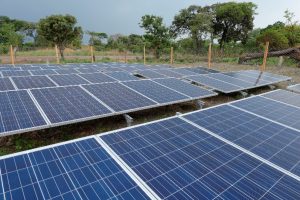Joint Cedefop/OECD symposium: Apprenticeships for greener economies and societies
English
International organizations
Information is gathered from other international organizations that promote skills development and the transition from education and training to work. The Interagency Group on Technical and Vocational Education and Training (IAG-TVET) was established in 2009 to share research findings, coordinate joint research endeavours, and improve collaboration among organizations working at the international and national levels.

Skills for green transition/climate action

The growing importance of sustainable development and the shift to a low-carbon and climateresilient economy will require new skills and qualifications, offering great potential for the creation of green jobs but also implying structural changes and a transformation of existing jobs. The transition to a low-carbon and greener economy will generate millions of new jobs, negatively affect some high-emitting sectors, and alter most existing occupations in terms of task compositions and skills requirements.
Ensuring the right skills for green jobs is a prerequisite to make the transition to a greener economy happen. Today, skills gaps are already recognised as a major bottleneck in a number of sectors, such as renewable energy, energy and resource efficiency, green building or environmental services. The adoption and dissemination of clean technologies require skills in technology application, adaptation and maintenance. Skills are also crucial for economies and
businesses, workers and entrepreneurs to rapidly adapt to changes deriving from climate change and environmental policies.
Joint Cedefop/OECD symposium: Apprenticeships for greener economies and societies
The joint Cedefop/OECD symposium on apprenticeship brings together policy-makers, practitioners and researchers from around the world to consider new research or analysis of practices exploring the links between apprenticeships and the transition towards greener economies and societies, as well as the implications for policy-making.
After a period of relative neglect in many countries, the past decade has witnessed a revival of apprenticeships, in recognition of their effectiveness in easing school-to-work transitions, but also increasingly because of their particular potential for developing skills closely tied to labour market needs.
The transition to a green economy and society aims at mitigating the environmental impact of human activity, including investment in environmentally friendly technologies, better waste management and land use, and changes in production, consumption and behaviour patterns, among others. Ambitious climate change mitigation policies are not only good for the environment, but also for jobs. The OECD’s 2020 Ministerial Council Statement highlights that OECD country recovery plans will boost growth, incomes and employment while promoting cleaner and more sustainable economies.
These changes have implications for preparing, reskilling and upskilling the workforce. Both the Paris Agreement and the European Green Deal (EGD) – the EU growth strategy – recognise that skills development is an indispensable pillar for the transition. Possessing the right set of skills will be essential in supporting worker mobility from sectors and jobs with declining employment – for example the oil and gas, agriculture, aviation and tourism sectors – to sectors such as renewable energy industries, where job opportunities rise rapidly; it will also be essential in creating a qualified workforce in the long term in a greener labour market. Apprenticeships can provide opportunities to develop the right skills for the green transition, both for young people in initial education and for adults in need of upskilling or reskilling.
Preregistration of general participants is now open.
To preregister, check the privacy statement and click here.
For more information click here.